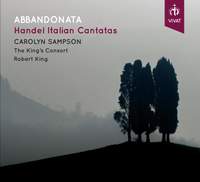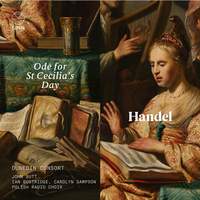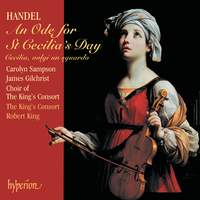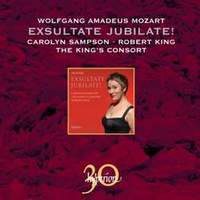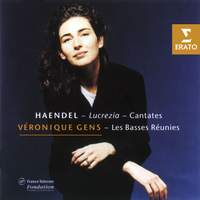Interview,
Carolyn Sampson on Abbandonata
 It’s been a fruitful autumn for Carolyn Sampson’s many fans: the British soprano makes magical contributions to John Butt’s new recording of Handel’s Ode to St. Cecilia’s Day with the Dunedin Consort on Linn and the final instalment of Masaaki Suzuki’s Bach Secular Cantatas series on BIS, as well as taking centre-stage in a programme of Handel’s Italian cantatas (including the highly dramatic Armida abbandonata and Agrippina condotta a morire) with The King’s Consort on the ensemble’s own label, Vivat. We spoke shortly before Christmas about the joys of bringing Handel’s complex and conflicted women to life in these compact works, how her long-standing relationship with The King’s Consort has developed over the past twenty years, why oratorio and recital-work figure more prominently than opera in her career, and how she feels about listening to her own early recordings…
It’s been a fruitful autumn for Carolyn Sampson’s many fans: the British soprano makes magical contributions to John Butt’s new recording of Handel’s Ode to St. Cecilia’s Day with the Dunedin Consort on Linn and the final instalment of Masaaki Suzuki’s Bach Secular Cantatas series on BIS, as well as taking centre-stage in a programme of Handel’s Italian cantatas (including the highly dramatic Armida abbandonata and Agrippina condotta a morire) with The King’s Consort on the ensemble’s own label, Vivat. We spoke shortly before Christmas about the joys of bringing Handel’s complex and conflicted women to life in these compact works, how her long-standing relationship with The King’s Consort has developed over the past twenty years, why oratorio and recital-work figure more prominently than opera in her career, and how she feels about listening to her own early recordings…
How different are the atmospheres and challenges of these four cantatas?
Agrippina was the one I knew best when we started work on the project, because I’d done it semi-staged with baroque gesture - and to be honest it’s probably still my favourite, because it showcases Handel’s gift for running a real gamut of emotions. We see her love for her son (and she certainly seems to find some pathos in that) as well as her anger: given her history of murdering husbands, she’s clearly not a woman to be crossed! Despite her ruthlessness, though, she still displays extraordinary tenderness, and the thrill and the challenge lies in going headlong from one end to the other: the scena in the middle is actually more recitative than aria, but even that in itself is just a roller-coaster journey.
In a way Armida is similar: it’s not as big a piece, but the emotional contrasts are still very well delineated. This is a woman who’s used to being able to have exactly what she wants, and her outrage when she sees him escaping is formidable - but her love for him is sincere and genuine, and even as she conjures up storms and furies she’s aware that she's still essentially powerless because it’s not going to cure her of her love for him. I think it’s crucial that both Agrippina and Armida should be portrayed as three-dimensional women: they’re not archetypes or caricatures of anything, and as a performer you have to approach them from the point of view that they’re emotionally real. The other two cantatas on the album are in some ways more difficult to perform, partly because they’re slightly unwieldy text-wise in places, and partly because they’re not dramas as such: you don’t have a role, and for me at least I find it easier when I can really get inside a character. But the musical qualities of these pieces are in no way diminished by their narrative, rather than outwardly dramatic, style.
Agrippina and Armida both appear as characters in full-scale Handel operas – are either of them roles you’d tackle onstage, and how different are they in the cantatas?
It’s nice to have the chance to sing Agrippina, as I’d be more likely to sing Poppea in the opera. I think Handel was a master with all of his operatic heroines, as they’re so well written in terms of dramatic and vocal pacing: for instance with Semele (which I’ve sung at ENO), you start off with a big aria to establish your character, and then it’s a fairly gentle build-up until you have something of a tour de force in Act Three! But what’s extraordinary about these cantatas is that he dives straight in and creates these very compact pieces of drama: they’re great fun to sing, because it almost feels like you’ve gone through the emotional turmoil of an entire opera in just 25 minutes!
You've collaborated regularly with The King’s Consort throughout your recording career: can you talk me through your history with the group?
I sang as a member of The King’s Consort before I had a career as a soloist: I used to do Robert’s 8- or 10-singer jobs at Wigmore Hall, and I’d do little solos if there was a little solo to be had. My first big break with them on disc was during the Vivaldi Sacred Music series; I believe it was Susan Gritton who was due to be recording quite a chunky cantata, Laudate Pueri, and she got sick and cancelled a week or two before. After a rehearsal for something else, Robert asked if I would mind reading through the score, and on the strength of that he asked me to record it. That was a fantastic break, as it’s a fairly major piece, and for me at that stage (it must’ve been in the late 1990s) it was a real opportunity for me to be on a significant recording with a big solo chunk. Then in January 2000, another soprano soloist cancelled a tour of the Bach Mass in B minor, and that was my first grown-up, out-the-front solo job! We did five performances around Europe and at the Barbican, and I remember that Magdalena Kožená was the second soprano - it was early days for her as well! I was only 25, and it felt like a very big thing to be doing.
Can you pick out any particular favourite recordings together?
One would have to be Exsultate, jubilate, which we recorded in 2005: again, it was so wonderful to be entrusted with something which has been recorded so many times by so many great singers at that stage in my career. I don’t listen to my own recordings as a general rule – that is, I listen to them once when they come out and then they tend to get put away again - but when I was recording Exsultate again for Masaaki Suzuki a couple of years ago I went back to that one and thought ‘Actually, it’s not bad at all!’
Speaking of returning to things, you recorded the Ode for St Cecilia’s Day with The King’s Consort fifteen years ago – how did it feel to come back to it with the Dunedins on their recent Linn recording?
It was quite different in several respects, and both were slightly nerve-wracking in their own way! Funnily enough, that old King’s Consort one was another step-in job for me: I got a call the night before asking me to substitute for Lisa Milne and the music was faxed straight over, which was extraordinary but also felt like safe territory because I knew Robert very well. With the Dunedins, I hadn’t met John [Butt] or worked with the group before, so there was a certain amount of nervousness - I’d heard wonderful things, and I can confirm that he’s a lovely, fabulous man to make music with and to talk to, but of course you never know until you get there! Like Robert, John is incredibly good at creating a nice atmosphere in recording-sessions: I loved working with him and would definitely do something again if they asked me. With the Dunedins I had the advantage of having recorded the piece before, and again I went back to the old recording and thought: ‘That’s really nice, but what do I want to do this time? Do I want to deliberately be different?’. And my conclusion was ‘Not really, because then it’s not about the music, it’s about you, and that can't be a motivation.’
You mentioned Semele earlier - do you have plans to do more Handel roles on stage?
I’d love to do Cleopatra and Rodelinda and Alcina, but the thing for me on a practical level is that I don’t do much opera because I don’t want to be away from home for too long: it has to be the right thing in the right place, and it has to fit in with my home-life, as I have two young children. Last year I did Pelléas et Mélisande at Scottish Opera, and I loved every moment of doing that production and working with David McVicar again - but it was a long time to be away, and that was within the UK! One of the reasons I wanted to do Abbandonata was that Handel is so central to my repertoire that it seems odd not to have done a disc that’s devoted to him, but I didn’t want the driving force behind the project to be simply ‘I’m a singer and I want to do a Handel album!’ or ‘Here’s a wish-list of Handel roles I’d like to sing!’. When I started thinking about the cantatas I initially considered including La Lucrezia alongside Armida and Agrippina, but then I remembered that Véronique Gens did the most wonderful recording of that exact programme around twenty years ago, so I started looking further afield. And I’m so glad we did, as Tra le fiamme is so beautiful in terms of the instrumentation: it’s extraordinary to hear Handel playing with new colours, like the Italian-style recorders that he maybe hadn’t come across much before. We’re doing the programme at Wigmore Hall next March, and I can’t wait to revisit it!
Abbandonata is out now on Vivat.
Available Formats: CD, MP3, FLAC, Hi-Res FLAC
Other recordings referenced in this interview
Handel: Ode for St Cecilia’s Day
Carolyn Sampson (soprano), Ian Bostridge (tenor), Dunedin Consort, John Butt
'In the 15 years since she recorded the Ode with King, Carolyn Sampson’s vernal soprano has acquired richer shadings…her poised, invariably graceful contributions are among the disc’s prime pleasures.' (Gramophone)
Available Formats: CD, MP3, FLAC, Hi-Res FLAC
Handel: Ode for St Cecilia's Day
Carolyn Sampson (soprano) & James Gilchrist (tenor), Choir of The King’s Consort & The King’s Consort, Robert King
'This recording is in a class of its own when it comes to the seemingly effortless, beautiful singing of Carolyn Sampson, now the best British early music soprano by quite some distance.' (Gramophone Classical Music Guide)
Available Formats: CD, MP3, FLAC
'Sampson confirms her growing reputation in 18th-century music with delectable performances, fresh and limpid of tone, stylish and shapely of phrase. The reams of coloratura in Exsultate jubilate! are truly joyous.' (Daily Telegraph)
Available Format: CD
Véronique Gens, Les Basses Réunies
Available Formats: MP3, FLAC


